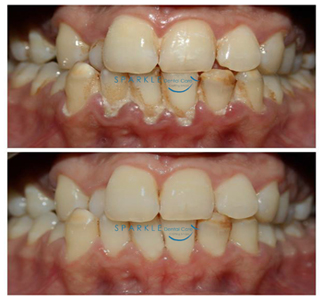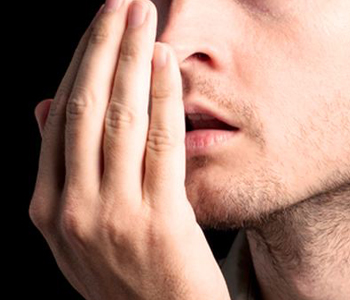GUM PROBLEMS AND BAD BREATH
GUM PROBLEMS

Gum disease is an infection of the tissues that surround and support your teeth. It is a major cause of tooth loss in adults. Because gum disease is usually painless, you may not know you have it. Also referred to as periodontal disease, gum disease is caused by plaque, the sticky film of bacteria that is constantly forming on our teeth.
Here are some warning signs that can signal a problem:
- gums that bleed easily
- red, swollen, tender gums
- gums that have pulled away from the teeth
- persistent bad breath or bad taste
- permanent teeth that are loose or separating
- any change in the way your teeth fit together when you bite
- any change in the fit of partial dentures
Some factors increase the risk of developing gum disease. They are:
- poor oral hygiene
- smoking or chewing tobacco
- genetics
- crooked teeth that are hard to keep clean
- pregnancy
- diabetes
- medications, including steroids, certain types of anti-epilepsy drugs, cancer therapy drugs, some calcium channel blockers and oral contraceptives
See us if you suspect you have gum disease because the sooner you treat it the better. The early stage of gum disease is called gingivitis. If you have gingivitis, your gums may become red, swollen and bleed easily. At this stage, the disease is still reversible and can usually be eliminated by a professional cleaning at your dental office, followed by daily brushing and flossing.
Advanced gum disease is called periodontitis. Chronic periodontitis can lead to the loss of tissue and bone that support the teeth and it may become more severe over time. If it does, your teeth will feel loose and start moving around in your mouth. This is the most common form of periodontitis in adults but can occur at any age. It usually gets worse slowly, but there can be periods of rapid progression.
Aggressive periodontitis is a highly destructive form of periodontal disease that occurs in patients who are otherwise healthy. Common features include rapid loss of tissue and bone and may occur in some areas of the mouth, or in the entire mouth.
Research between systemic diseases and periodontal diseases is ongoing. While a link is not conclusive, some studies indicate that severe gum disease may be associated with several other health conditions such as diabetes or stroke.
It is possible to have gum disease and have no warning signs. That is one reason why regular dental checkups and periodontal examinations are very important. Treatment methods depend upon the type of disease and how far the condition has progressed. Good dental care at home is essential to help keep periodontal disease from becoming more serious or recurring. Remember: You don’t have to lose teeth to gum disease. Brush your teeth twice a day, clean between your teeth daily, eat a balanced diet, and schedule regular dental visits with us for a lifetime of healthy smiles. Speak with us; let us clear your doubts and help you know more about this procedure!!!
Back to top
BAD BREATH

Whether you call it bad breath or halitosis, it’s an unpleasant condition that’s cause for embarrassment. If you’re concerned about bad breath, visit us. Bad breath can be caused by a number of sources, we can help identify the cause and determine the best treatment.
What causes bad breath?
- Food What you eat affects the air you exhale, like garlic or onions. If you don't brush and floss daily, particles of food can remain in the mouth, collecting bacteria, which can cause bad breath. Dieters may develop unpleasant breath from infrequent eating.
- Gum disease: Persistent bad breath or a bad taste in the mouth can also be one of the warning signs of gum disease; which is caused by plaque.
- Dry mouth: This occurs when the flow of saliva decreases and can be caused by various medications, salivary gland problems or continuously breathing through the mouth. Without enough saliva, food particles are not cleaned away. If you suffer from dry mouth, we may prescribe artificial saliva, suggest using sugarless candy or increase your fluid intake.
- Smoking and tobacco: In addition to staining teeth and being bad for overall health, tobacco can add to bad breath. Tobacco reduces your ability to taste foods and irritates gum tissues. Tobacco users are more likely to suffer from gum disease and are at greater risk for developing oral cancer.
- Medical conditions: Some diseases have symptoms related to bad breath. Sinus or lung infections, bronchitis, diabetes, and some liver or kidney diseases may be associated with bad breath.
If you’re concerned about what’s causing your bad breath, make an appointment to see us. Regular checkups allow us to detect any problems such as gum disease or dry mouth. Bad breath may be the sign of a medical disorder. If we determine that your mouth is healthy, you may be referred to your primary care physician.
It’s important to note that mouthwash will only mask the odor temporarily. Mouthwashes are generally cosmetic and do not have a long-lasting effect on bad breath. If you must constantly use a breath freshener to hide unpleasant mouth odor, schedule a visit with us soon. Speak with us; let us clear your doubts and help you know more about this procedure!!!
Back to top

